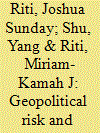|
|
|
Sort Order |
|
|
|
Items / Page
|
|
|
|
|
|
|
| Srl | Item |
| 1 |
ID:
136340


|
|
|
|
|
| Summary/Abstract |
“Salafi”, also known as salafiyya, is derived from the Arabic, meaning“the venerable predecessors”, who are the“first three generations of Islam”. In the different interpretations of the Arabic scriptures,“Salafi” evolved gradually into“Doctrinal, Political and Jihad Salafi”.“Jihadist Salafi”, also known as“Salafi Jihadism”or the“Salafi Global Jihad Movement”, by means of falsification of the religious terms in the Koran and Hadith, bewitched its followers with a message of martyrdom for Islam through violence and“Jihad”, eliminated all the heretics, established Islamic political power and restored“true Islam”religiously. Since 2011, a series of terrorist attacks carried out by“Jihadist Salafi”, represented by Jund al-Khilafah in Central Asia, have posed serious threats to regional security. This not only impacts on the anti-extremism policies and anti-extremism policies of Central Asian countries and severely challenges the SCO and CIS, but also poses a significant threat to the security of China’s Northwest.
|
|
|
|
|
|
|
|
|
|
|
|
|
|
|
|
| 2 |
ID:
186422


|
|
|
|
|
| Summary/Abstract |
Currently, the high incidence of environmental degradation is widely quoted as one of the key global concerns. Previous literature has examined various determinants of environmental degradation, yet, there is an inadequacy of studies on geopolitical risks (GPR) and environmental degradation nexus. Additionally, an issue of concern on aggregate estimations is aggregation bias which may cause the wrong estimation of the aggregate relationships, and mislead policymakers. This paper, therefore, investigates the impact of GPR on the environment of BRICS to assess the existence or otherwise of aggregation bias. The findings which emanate from a robust empirical estimation indicate that the relationship is positive at aggregate level while negative at disaggregated level, hence, the existence of aggregation bias in the estimation of GPR-environmental degradation relationship at the aggregate level. The results further show that the disaggregated level result does not support the aggregated level environment-GPR findings. Consequently, policy implications of aggregation bias in estimations may be drawn as follows: Since the aggregation bias may lead to a wrong environment-GPR postulation, policymakers could be misinformed by the incorrect evidence to give wrong policies about environmental concerns. Also, policymakers should consider the environment-GPR nexus at both aggregate and country-specific levels when making environmental policies.
|
|
|
|
|
|
|
|
|
|
|
|
|
|
|
|
|
|
|
|
|